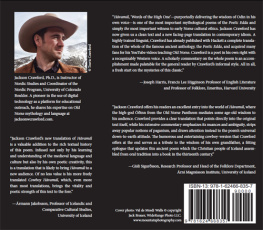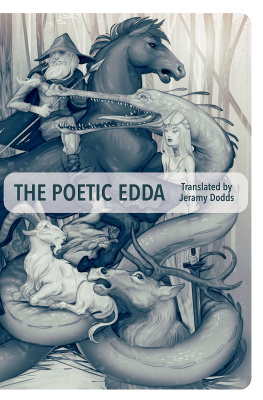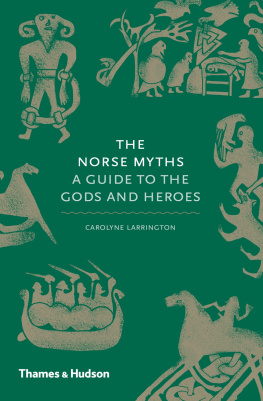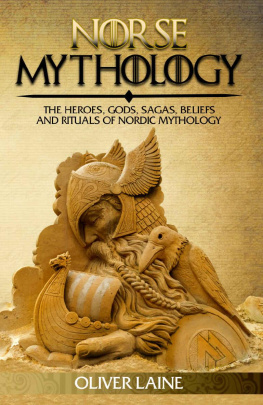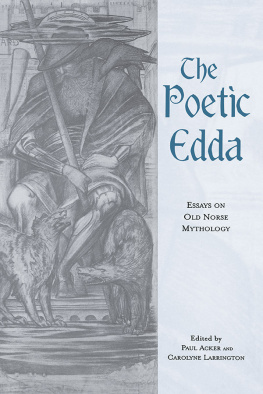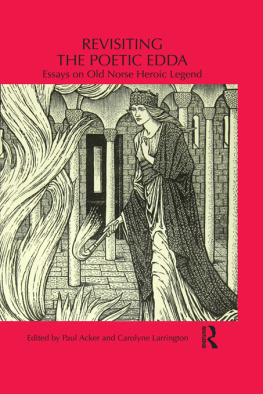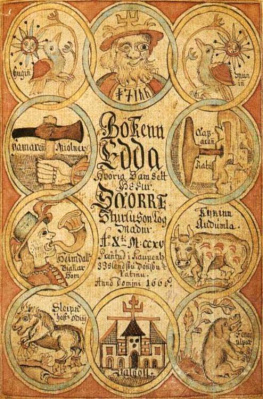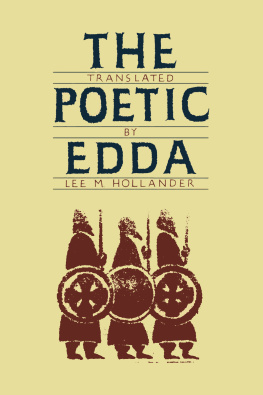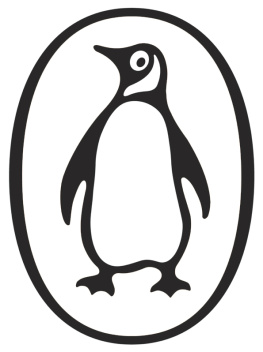Jackson Crawford - The Poetic Edda: Stories of the Norse Gods and Heroes
Here you can read online Jackson Crawford - The Poetic Edda: Stories of the Norse Gods and Heroes full text of the book (entire story) in english for free. Download pdf and epub, get meaning, cover and reviews about this ebook. year: 2015, publisher: Hackett Publishing, genre: Art. Description of the work, (preface) as well as reviews are available. Best literature library LitArk.com created for fans of good reading and offers a wide selection of genres:
Romance novel
Science fiction
Adventure
Detective
Science
History
Home and family
Prose
Art
Politics
Computer
Non-fiction
Religion
Business
Children
Humor
Choose a favorite category and find really read worthwhile books. Enjoy immersion in the world of imagination, feel the emotions of the characters or learn something new for yourself, make an fascinating discovery.

- Book:The Poetic Edda: Stories of the Norse Gods and Heroes
- Author:
- Publisher:Hackett Publishing
- Genre:
- Year:2015
- Rating:3 / 5
- Favourites:Add to favourites
- Your mark:
- 60
- 1
- 2
- 3
- 4
- 5
The Poetic Edda: Stories of the Norse Gods and Heroes: summary, description and annotation
We offer to read an annotation, description, summary or preface (depends on what the author of the book "The Poetic Edda: Stories of the Norse Gods and Heroes" wrote himself). If you haven't found the necessary information about the book — write in the comments, we will try to find it.
The Poetic Edda: Stories of the Norse Gods and Heroes — read online for free the complete book (whole text) full work
Below is the text of the book, divided by pages. System saving the place of the last page read, allows you to conveniently read the book "The Poetic Edda: Stories of the Norse Gods and Heroes" online for free, without having to search again every time where you left off. Put a bookmark, and you can go to the page where you finished reading at any time.
Font size:
Interval:
Bookmark:
The Poetic Edda : stories of the Norse gods and heroes / translated and edited, with introduction, by Jackson Crawford. pages cm Includes bibliographical references. ISBN 978-1-62466-356-7 (pbk.) ISBN 978-1-62466-357-4 (cloth) 1. EddasTranslations into English. 2. 3. 3.
Mythology, NorsePoetry. I. Crawford, Jackson, translator, editor. II. Title. PT7233.C73 2015 839.61dc23 2014032991 PRC ISBN: 978-1-62466-415-1 To two fire-hearted heroes, gone far away,
whose spirits breathe life in me still:
To Papa, my biggest inspiration,
and Wyatt, my smallest.
Og til deg, du nkkel, ls og dr,
mitt hjartas stad
mi grue, kveike, ved og glr,
eg gjev mitt kvad.
The mistakes and infelicities in this book are, naturally, attributable to me alone. Jackson Crawford
Riverton, Wyoming
December 29, 2014
 Note: The English titles are not necessarily translations of the Old Norse titles, but are meant to assist in remembering the content of each poem.
Note: The English titles are not necessarily translations of the Old Norse titles, but are meant to assist in remembering the content of each poem. During the so-called Viking Age (roughly AD 8001100), the fierce Scandinavian pirates and adventurers known as Vikings robbed and raided in nearly every country of Europe, and explored as far afield as Baghdad and the eastern coast of present-day Canada. Meanwhile, they developed an extensive poetic literature about their gods and heroes, which their Christian descendants would commit to writing many centuries later. Readers must understand a few facts about the culture that produced these poems, since the characters in them often act in a way that is incompatible with twenty-first-century social norms. Norse society prized a warlike, aggressive stance in men, and in the gods they worshipped. Fighting over limited resources, and even naked aggression against neighbors, was not necessarily considered wrong if it advanced ones wealth and honor and that of ones family. With the availability of natural resources sharply limited in medieval Scandinavia by its harsh climate and (in many regions) by sparse farmland, violent competition between families was a fact of life, and the raiding of overseas territories blessed with more food and gold must have seemed no more ethically problematic than the killing of an animal for its flesh and hide.
Not that Norse society recognized no code of ethics. But unlike modern moral standards, which tend to be utilitarian and altruistic (Does a given action benefit someone without harming someone else?), the Norse moral code was based on gaining and maintaining {x} honor, and avoiding shame. Honor was gained principally through displays of ones courage in confrontations with enemies, initiative and hard work at the farm and aboard ship, and a readiness to use violence in return for the violence done to ones friends and relatives. Those who show these qualities most abundantly, such as the god Thor and the hero Sigurth, are praised, in spite of actions that modern society would consider crude or evil (Thor owns slaves, for instance, and in the poem Harbarthsljoth he tells his father Odin that he would have gladly helped him hold down a woman he was trying to have his way with). In a society in which the main social unit was not the individual but the family, it was imperative for members of the family to maintain their honor by avenging any harm done to another member of their family. If a mans brother had been killed, he would have to take revenge on the killer, but he might exact vengeance by killing a member of the killers family rather than by killing the perpetrator directly.
This promise of mutual revenge bound a family together in a feuding world, and thus there was a special horror for the notion of accidentally or knowingly doing damage to ones own family. Nonetheless, the heroes of the Poetic Edda are sometimes forced to take action against their own families, usually because of the ironclad force of their sworn words and boasts. The Eddic poems depict a world in which a persons words are absolutely binding, no matter the consequenceswhich are often tragic. For instance, in Helgakvitha Hjorvarthssonar, Hethin boasts (while drunk) that he will take his brother Helgis lover, the Valkyrie named Svava. Though Hethin regrets this foolish and dangerous oath almost immediately, Helgi casually accepts that it is his brothers duty to carry it through: [33] Dont concern yourself, Hethin; the oaths men make while drinking will always prove true. A king has challenged me to a duel, and before three nights have passed, I must meet him at the appointed place.
I doubt that I will survive; and then it would be good, if you took Svava. {xi} But of course, the problems created by such oaths are not always resolved so conveniently. The greatest tragedy of the heroic poems is the murder of Sigurth, which is brought about because Brynhild has been tricked into breaking her vow that she will marry only a man who knows no fear (she marries Gunnar, believing him to be the fearless man who braved her test of courage, but in fact it was Sigurth in disguise). Since not Brynhild but her sister-in-law Guthrun married the fearless Sigurth, Brynhild insists that her husband Gunnar must kill him. But even here, Gunnar and his brother Hogni will not break their oaths of blood-brotherhood with Sigurth, and Gunnar instead must get his brother Gotthorm, who was too young to swear oaths with Sigurth, to commit the murder. One gets a sense from scenes like this that faithfully keeping promises ought to be the glue that holds society together, but instead tears it apart.
Font size:
Interval:
Bookmark:
Similar books «The Poetic Edda: Stories of the Norse Gods and Heroes»
Look at similar books to The Poetic Edda: Stories of the Norse Gods and Heroes. We have selected literature similar in name and meaning in the hope of providing readers with more options to find new, interesting, not yet read works.
Discussion, reviews of the book The Poetic Edda: Stories of the Norse Gods and Heroes and just readers' own opinions. Leave your comments, write what you think about the work, its meaning or the main characters. Specify what exactly you liked and what you didn't like, and why you think so.

